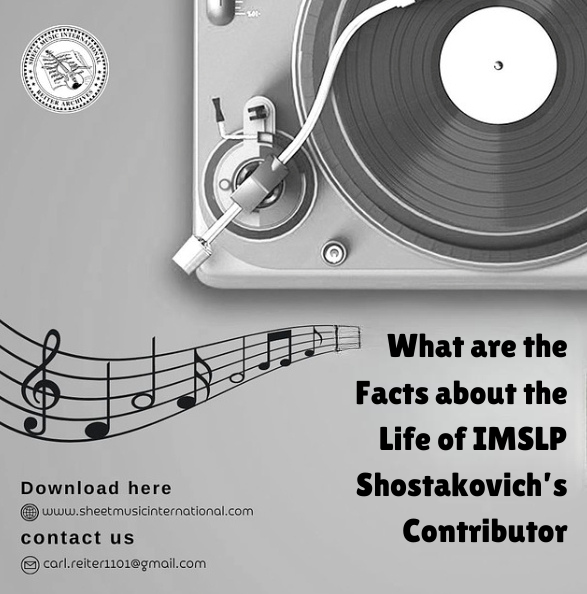
Your Request is under process, Please wait.


The bitter-sweet trajectory must be the correct phrase to encapsulate the career of DmitrDmitriyevich Shostakovich as a Russian composer and Soviet member.
The bitter-sweet trajectory must be the correct phrase to encapsulate the career of Dmitri Dmitriyevich Shostakovich as a Russian composer and Soviet member. His work earned international fame, like that of Moonlight Sonata, once he released his first symphony in 1926. As one of the major composers, he developed numerous popular compositions until the government interacted with his works. As a successful member of the Soviet Union, he had this unusual complexity with his government. The Soviet government questioned his several works that risked his career to great extents.
Moreover, nowadays, numerous scholars are interested in his works and study his way of composing through IMSLP Shostakovich. While some appreciate his genius compositions, there are others debating about his relationship with the government.
Are you too intrigued by the geniuses of Dmitri Dmitriyevich and wonder about his tarnished relationship with the government? Surely, his life as a composer and a Soviet Union member was subjected to numerous ups and downs. Are you ready to unravel it? Continue reading to get started.
Dmitri Shostakovich was a musical alchemist who ruled out the tradition of composing fully synchronized compositions. Uniquely, as a post-revolution composer, he embraced unevenness (At Least it appeared that way). However, if you go through his musical pieces in detail, you will know they are riddled with private music codes and ciphers. A myopic and socially awkward personality has found his solace in creating genius musical pieces that extraordinarily show unevenness.
Listen to his overdrive for one minute and then the introspective à la Mahler. This steady jump might be unnatural for the listener but not for the creator. However, this unusual characteristic of his work never shades the fact that his creations won the hearts of many. His IMSLP is a work of musical wonders like any other, such as IMSLP Schubert.
Those who are introduced to the work of Shostakovich will certainly get confused over the uneven transitions between the different musical pieces. However, few of them are able to understand the musical codes and ciphers this genius has used in the process of creating unique masterpieces. Even his oldest fans are unaware of this fact. But it is not an easy task to interpret those codes by him.
The easiest code that could be deciphered by his listeners includes the DSCH. If you dig a bit deep, you will know that this is the personal musical motto of Shostakovich, and his lexicon traces are found in German transliteration of his name.
He was so into penning down the brittle irony that it gave him the taste of big troubles. In 1936, the then-Soviet Politician, Stalin scheduled his visit to a performance of the operatic grotesquerie, Lady Macbeth of Mtsensk by Shostakovich. He attended the whole performance and put his censors on it because it did not positively flag-wave as per his expectations. The newspaper Parada followed suit and fiercely attacked his works through the prints when the whole situation remained out of control.
Now, this is the time for Shostakovich. He had to quickly give the public a winning musical piece that also complied with the regulations of the state. He had to quickly release a winning musical piece. Also, those pieces had to comply with the State regulations. So, he composed the Fifth Symphony, which paved his way toward the triumph of exiting the adversities. It impressed the government, and the public open-handedly welcomed this musical piece. Hence, you can call it a great success after the censorship of this masterpiece by Stalin.
It was not until 1946 when Shostakovich received another blow. He created a light-hearted Ninth Symphony with the simple goal of entertaining the audience. However, this aim was not reflected in the ideology of the state. The government censored it on the grounds that it lacked a clear ideology. After just 2 years, in 1948, he along with several other contemporary composers was thawed for degrading the culture and ignoring moral aspects.
This ambitious musical genius left the world under political pressure, censorship, and fear. He was a creative person who socially appreciated Soviet Society, but his compositions had hidden meanings condemning the same. The Soviet Union too had respected his works and censured it simultaneously. This bitter-sweet relationship never confirmed the notice that the government printed and circulated after his death. That notice said that finding his inspiration in the reality of Soviet life, reasserting and developing in his imagination the arts of socialist realism. With every word, the official note by the government went farther from conveying the truth.
This unskeptical genius composer had won the hearts of many during his time. Even in the present day, many musical scholars enjoy studying his works on IMSLP Shostakovich. That is the power of true music that is unique and beautifully composed by the artist. Moreover, if you are someone who loves to hear great compositions like Moonlight Sonata, this free music library at Sheet Music International is waiting for you.
From IMSLP Schubert to the music of Beethoven, download the best music compositions for free, and continue your music-learning expedition!









.png)